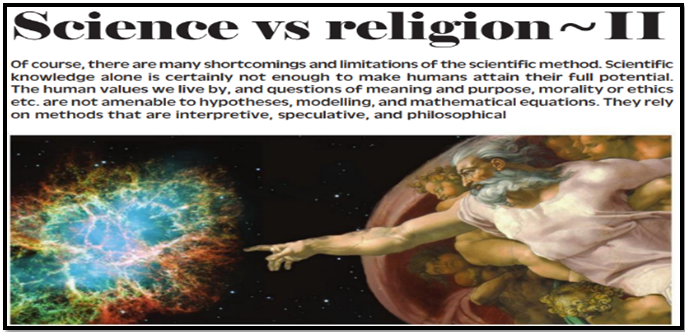THE WRONG COOKS SPOILING THE SCIENTIFIC BROTH
Syllabus :
- Sociology Optional : Science and Religion
- GS 4 : Ethics , Integrity and Aptitude
Focus:
- In India, the juxtaposition of religion as a revered entity and science as a financial resource creates a unique dichotomy.
- While religion serves as a sacred cow and a cash cow, science often finds itself in a similar dual role, although with differing perceptions and applications.
- The prevailing belief among the populace is that integrating science into the educational system fosters intelligence, open-mindedness, and objectivity among students. However, the reality within scientific institutions often tells a different story.
Understanding the Relationship Between Religion and Science
- Diverse Perspectives on the Relationship:
- The relationship between religion and science sparks widespread debate globally.
- Perspectives range from conflict to coexistence, with some viewing them as separate realms addressing distinct human experiences.
- Both religious and scientific institutions advocate for harmony between faith and empirical inquiry, influenced by cultural and traditional contexts.
| Defining Religion:
· Religion encompasses beliefs, customs, and worship directed towards a controlling force, not necessarily God. · Historically, the term lacked precise definition until anthropologist EB Taylor’s work. · Religion significantly influences societal and individual actions, as well as physical and mental well-being. Understanding Science: · Science entails the pursuit and application of knowledge through experimentation, observation, and evidence. · Initially termed natural or experimental philosophy, it was standardized in the nineteenth century by William Whewell. · Science represents curiosity about the world and its phenomena, constantly leading to new questions and discoveries. |
- Exploring the Relationship:
- The relationship between science and religion spans natural inquiry and spiritual analysis.
- While science delves into the natural world, religion focuses on spiritual or supernatural realms.
- Interdependence between the two is acknowledged by many scholars, yet conflicts arise, particularly in topics like evolution.
- Differences Between Science and Religion:
- Science primarily concerns the natural world and provides evidence-based explanations.
- Religion, on the other hand, addresses both natural and supernatural realms, relying on beliefs and faith.
- Science emphasizes logical reasoning, while religion often relies on faith and the influence of higher powers.
- Complementary Nature:
- Despite differences, individuals can embrace both science and religion, reflecting their distinct yet complementary roles in human life.
- The relationship between science and religion is ongoing, characterized by both harmony and dynamic interaction.
- While science offers systematic and logical exploration, religion provides spiritual depth and cultural richness.
Quarter-Cooked Scientific Temper:
- Despite the idealistic perception of science, many institutions house scientists with only a superficial understanding of scientific principles.
- Within these scientific enclaves, power dynamics frequently overshadow the pursuit of knowledge. As a result, the influence of American journals tends to dictate the direction of research and academic pursuits.
- Scholarly focus often gravitates towards topics deemed favourable by Western standards, leading to the neglect of local issues.
For instance, while the crisis at Bellandur Lake in Bengaluru demands urgent attention, scholarly discourse prioritizes topics that align with Western academic tastes.
The Scientific Paradigm :
(Climbing Down the Ivory Tower)
- The prevailing scientific paradigm often encourages scientists to remain ensconced within their ivory towers, focused solely on solving puzzles within their specific discipline.
- However, the pressing challenges of our time, such as the threats posed by developments like artificial intelligence or environmental crises, necessitate a shift in scientific focus.
- Scientists must transition from their isolated domains to engage with real-world problems.
- This requires them to step out of their comfort zones, mingle with diverse communities, and get their hands dirty in the pursuit of practical solutions.
Challenges :
- The transition towards interdisciplinary collaboration poses several challenges for Indian scientists.
- Are they equipped with the necessary skills and mindset to engage with diverse knowledge sources?
- Can scientists adapt to a humanistic problem-solving approach, embracing humility and a willingness to learn from different perspectives?
- Will they relinquish control and engage with communities to address local and global challenges effectively?
Need of the Hour:
- Addressing complex, multifaceted problems requires an interdisciplinary approach that integrates knowledge from various disciplines.
- While natural sciences provide mechanistic explanations, social sciences offer insights into human behaviour and societal dynamics.
- Humanities disciplines, on the other hand, provide tools for analyzing ethical dilemmas and producing qualitative knowledge through logical argumentation.
- By embracing a holistic approach that draws upon diverse disciplinary perspectives, scientists can gain a deeper understanding of real-world issues and develop more effective solutions.
Conclusion:
Embracing interdisciplinary collaboration and engaging with diverse knowledge sources is essential for addressing the complex challenges of our time. Indian scientists must transition from the isolation of their ivory towers to dynamic engagement with real-world issues, fostering a culture of humility, learning, and community collaboration. Only through such concerted efforts can science truly fulfill its potential as a force for positive change in society.
Source:
Mains Practice Question :
Discuss the unique dichotomy created by the juxtaposition of religion as a revered entity and science as a financial resource in India. How does this dichotomy influence the relationship between religion and science.




